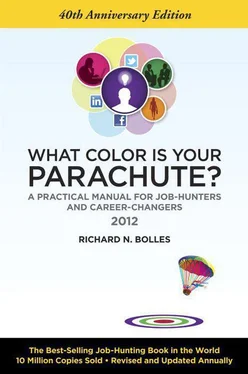e. You want to go into the interview with the employer curious to know more about you, but the employer is first of all curious about what you know about them . Employers don’t like blind dates.
f. You want employers to save your job-hunt by increasing their hiring, and you want the government to give them incentives to do so. Unhappily, employers tend to wait to hire until they see an increased demand for their products or services. In the meantime, most do not much care for government incentives to hire, because they know such incentives always have a time limit, and once they expire, that employer will be on the hook to continue the subsidy out of their own pocket. What all this adds up to is that employers won’t come to save you. The success of your job-hunt depends on you—with a little help from your friends. You must be in charge of it. You must plan it. You must direct it. You must know what works and what doesn’t work. Your job-hunt is by its very nature a “self-directed search.”
With this background concerning the differences between your world and the employers’ world, we are ready to understand not only what are the five worst or five best ways for discovering those vacancies that are out there, but also why they are the worst or the best. ( Here comes a generalization .) In general, it is risk that determines which job-hunting methods “employers” prefer. Most employers prize low risk in hiring—they prefer that they or someone they respect has actually seen the job-hunter perform, and can testify from their experience that this job-hunter would be a good hire. In-house promotion is their absolute preference. But referrals, particularly in-house referrals, are a gold standard. So is recommendation by some fellow employer or colleague whose opinions they trust.
Because of their fear of risk, employers tend to be much more focused on a job-hunter’s experience than they are on his or her potential , or skills , or knowledges . They prefer to hire someone who has had past experience in this or related fields, rather than a career-changer who is new to the field and to the job. ( Good news: there are ways of getting around this, as we shall see later, in chapter 12 .) Of course there are sterling exceptions to what I have just said, but you have to hunt harder, to find them.
JOB-HUNTING METHODS WERE NOT CREATED EQUAL
Now to our lists. But first a word about my methodology, such as it is. There is absolutely nothing scientific here. The statistics, the percentages, are guesses. My guesses.
That’s because, on the one hand, we don’t have much research comparing how well job-hunters’ methods work. Researchers tend to study employers’ behavior and preferences, but not job-hunters’.
On the other hand, if you are in this field for forty years, as I have been, and you keep your eyes open, you do run into a small study here, a small study there, that gives you a pretty good idea, over time, of what works, what doesn’t, and to what degree. I watch for these all the time, but I don’t keep records of what study, what year, who did it, and that kind of thing. Studies about job-hunters’ behavior are notoriously “squishy,” and not worth leaning too heavily on. So, I read this stuff, and then store just the basic statistics away in my head, so when it comes time to make guesses, I don’t make them out of thin air. They are educated guesses, based on research and observation.
Now, when all is said and done, what difference do these odds make? Just this. There are 18 alternative ways of looking for work, as we have seen; but unfortunately, these alternatives were not all created equal. Some methods of hunting for jobs have a pretty good track record, and therefore will repay you for time spent pursuing them. But other methods have a pretty poor track record, and you can waste a lot of time, and energy, on them, with no results, if you’re not careful. So, this is all about conservation of energy. Your energy. The lesson from all this is: don’t waste your time or energy on the least effective job-hunting methods, unless you’re one of these people who likes to bet against the odds, the bigger the better.
Here, then, are my educated guesses as to what percentage of job-hunters who use each method actually succeed thereby in finding a job.
You will notice that some of our country’s favorite job-hunting strategies are on the list of least effective . I was as surprised as you.
THE FIVE WORST WAYS TO LOOK FOR A JOB
Only a 4 to 10% Success Rate
1. Looking for employers’ job-postings on the Internet.Yeah, I know, you’re somewhere between surprised and shocked at this finding. I was too. For now, we are talking about the Internet in just one of its capacities: as a place where job-hunters can find jobs, whether through posting their resume, or looking for employers’ job postings, working through social media, websites, Twitter, or blogs. The question is, how helpful is this use of the Internet, and this use only?
The answer is: well, that depends.
You will hear stories of job-hunters who have successfully used the Internet to find a job. The stories are very impressive. Here are some examples.
A job-seeker, a systems administrator in Taos, New Mexico, who wanted to move to San Francisco posted his resume at 10 p.m. on a Monday night, on a San Francisco online bulletin board ( Craigslist.org ). By Wednesday morning he had over seventy responses from employers.
Again, a marketing professional developed her resume following guidance she found on the Internet, posted it to two advertised positions she found there, and within seventy-two hours of posting her electronic resume, both firms contacted her, and she is now working for one of them.
I get letters about this, too. “In May I was very unexpectedly laid off from a company I was with for five years. I did 100 percent of my job search and research via the Internet. I found all my leads online, sent all my resumes via e-mail, and had about a 25 percent response rate that actually led to a phone interview or a face-to-face interview. It was a software company that laid me off, and I am [now] going to work for a publishing company, a position I found online.”
And: “Thanks to the Internet, I found what I believe to be the ideal job in [just] eight weeks—a great job with a great company and great opportunities….”
So we see the Internet can do a marvelous job of making it possible for an employer and a job-hunter to get together, in a way that was rarely possible even fifteen years ago. Internet sites devoted to job-hunting—some experts say there are over 100,000 “job-boards” now—make it possible for job-hunter and employer to get together faster than ever before in history.
So, you’ll want to try it. Of course, it doesn’t always work. Aye, and there’s the rub! It turns out, despite all the hype, that it actually doesn’t work for a huge percentage of those who try it. Researchers have turned up the fact that out of every 100 job-hunters who use the Internet as their search method for finding jobs, 4 of them will get lucky and find a job thereby, while 96 job-hunters out of the 100 will not—if they use only the Internet to search for a job.
Disclaimer: If you are seeking a technical or computer-related job, an IT job, or a job in engineering, finances, or healthcare, the success rate rises, to somewhere around 10 percent. But for the other 20,000 job-titles that are out there in the job-market, the success rate reportedly remains at about 4 percent .
Читать дальше












